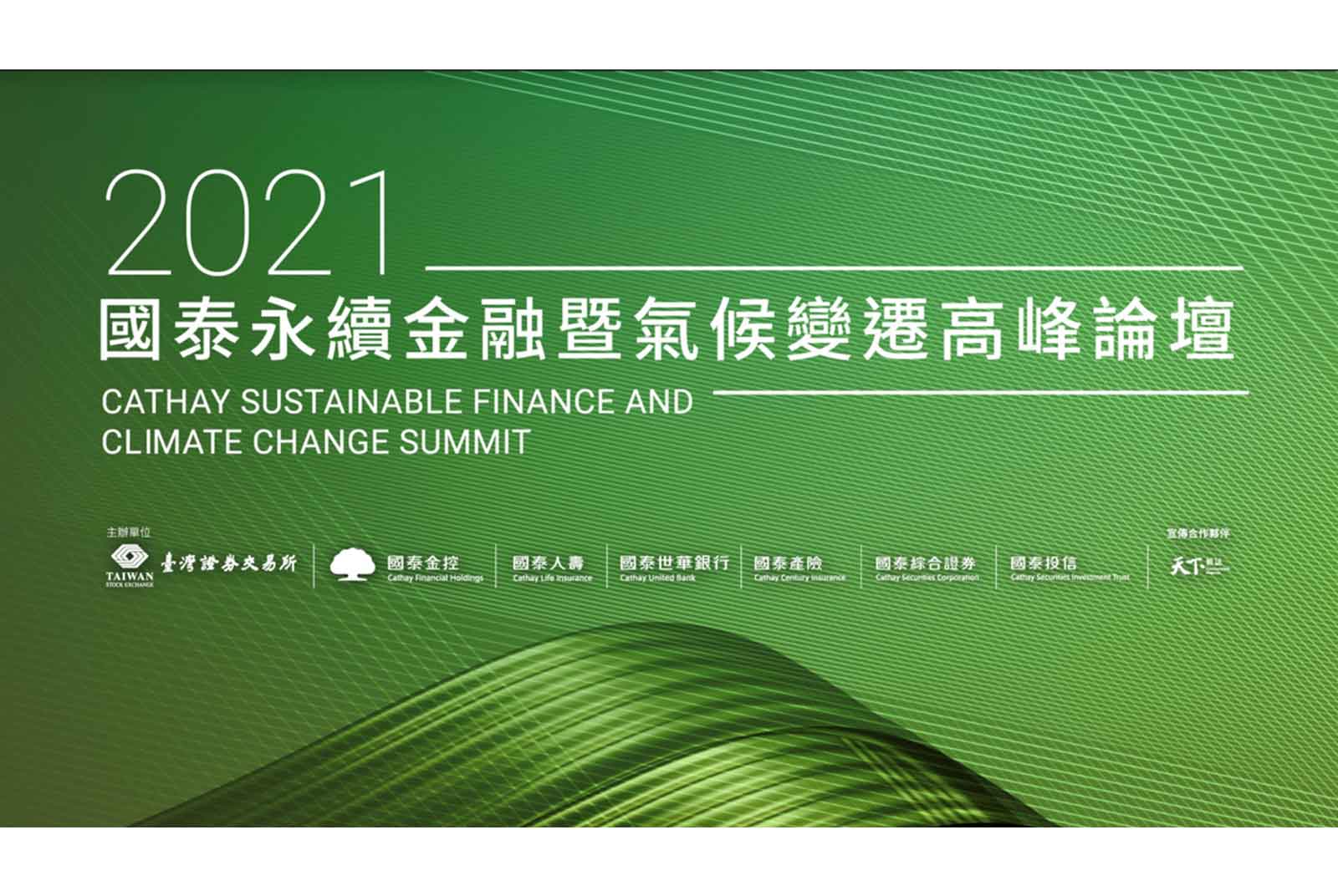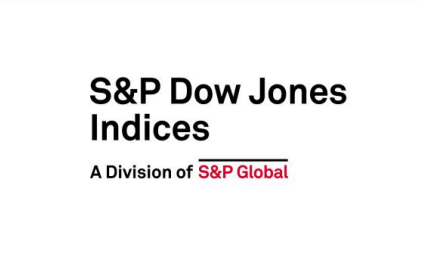2021-12-28
By Cathay Financial Holdings
2021-12-28
The 2021 Cathay Sustainable Finance and Climate Change Summit took place on December 7 with a record high participation through online stream. More than 1,500 persons and over 800 companies and organizations registered, which is over four times more than the numbers in 2020. Publicly listed companies that registered for the event account for 76% of Taiwan's stock market value, including 39 of the 50 largest Taiwanese corporations by market value. Companies that registered also account for 51% of Taiwan's total carbon emissions. This year, attendance at the Summit was recognized as continuing education credits for board directors and supervisors at listed companies. 247 board directors and supervisors representing 363 listed companies participated in the event. In addition, this year not only marked the first time six world-recognized ESG experts accepted invitations to participate, but key representatives from Taiwan's industry, government, and academia were also on hand, making the event an important platform for communication focusing on Taiwan's ESG trends and experiences.
Cathay Financial Holding Co., Ltd. (Cathay FHC) Chairman Hong-Tu TSAI noted during the Summit that 2022 will mark the Cathay's 60th anniversary, and said he has gained a deep understanding that to ensure long-term survival, a company must attain both sustainability and profitability. Organizing the Summit for the fifth straight year is one of Cathay's sustainability efforts. Cathay has turned the influence of its assets into a force for pressing companies to respond to CDP, the world's largest platform for disclosing information on carbon emissions. As of the end of 2020, Cathay had implemented 670 in-depth engagements with companies, and 65% of the companies successfully engaged by Cathay as the lead investor improved their CDP score the following year.
"Through this Summit as well as Cathay’s engagements, we have called for immediate sustainable actions from investees and borrowers. We hope that Taiwan can perform well and this will be recognized by the international community," said Hong-Tu TSAI.
Cathay itself has achieved a number of ESG milestones in Taiwan. Cathay Life Insurance, Cathay United Bank, and Cathay Century Insurance led the way in voluntary compliance with sustainability standards such as the UN's Principles for Responsible Investment (PRI), Principles for Responsible Banking (PRB), and Principles for Sustainable Insurance (PSI). Cathay is also the only Taiwanese financial firm to participate in a number of international climate-related initiatives, including Climate Action 100+ and the Asian Utilities Engagement Program. Cathay has also applied to join RE100, and committed for all its business operation sites in Taiwan will utilize 100% renewable energy by 2030, and achieve net-zero activities by 2050.
The Summit was enthusiastically received, and the reason was the same as Cathay's reason for proactive promotion for sustainability: for corporations, climate change has become a matter of survival. From the Carbon Border Adjustment Mechanism (CBAM) to COP26 resolutions, this environmental issue has already metamorphosed into an economic, political, and societal challenge, and elevated companies' ESG (environmental, social, and corporate governance) strategies from one limited to the CSR domain to their entire operations.
Five keys in implementation of a sustainability strategy
During his opening remarks, Financial Supervisory Commission (FSC) Chairman Tien-Mu HUANG stressed that policy implementation is critical to climate change mitigation and sustainable finance, asserting that attention must be given to five key points. First, consistent targets; second, adjustments must be made in response to ongoing change; third, government policy must adhere to principles of fairness and proportionality given that companies differ in scale; fourth, assistance must be given to disadvantaged groups and companies with fewer resources; and fifth, goals must be achievable. Companies must propose workable strategies, and become responsible participants for sustainable finance and climate change mitigation.
"Climate change mitigation or sustainable finance is a high-level policy aspiration, but for individual companies, it is an important opportunity for organizational reform. For example, performing a carbon footprint inventory is an important decision for a corporate board," said Tien-Mu HUANG.
Director-General Brenda HU of the FSC's Department of Planning stated that in order to firmly establish sustainable finance practices, the FSC is studying the EU's approach and drafting a standardized taxonomy of sustainable activities. It will first be tested in three major industries--manufacturing, construction and real estate, and shipping and warehousing--providing the financial industry with a basis for assessing investment and financing opportunities. The taxonomy encompasses six major environmental goals--climate change mitigation, climate change adaptation, water and marine resources, circular economy, pollution prevention, and biodiversity--as well as social protections (of human rights, worker rights, and social development). Business activities must satisfy at least one environmental goal and not hinder other goals, while also achieving social protection--only then are they in line with sustainability.
Climate action strategies to leverage companies' transition to green operations
Deputy Minister of Economic Affairs Wen-Sheng TSENG said that the Ministry of Economic Affairs will help companies reduce carbon emissions by first designating carbon footprint verification tools. Second, it will formulate regulations on wholesale purchases of commercial renewable energy, which is currently limited to Taiwan's state-owned power utility, so that more companies can buy low-carbon energy. Lin-Yi TSAI, Director of the Climate Change Office at the Environmental Protection Administration (EPA) stated that in response to the European Union's CBAM, the EPA will simplify administrative procedures to help small and medium-size enterprises to perform carbon footprint inventories. The Climate Change Response Act currently being drafted will include a carbon tax, with rates taking into consideration the level of domestic economic development and using a phased approach to implementation.
International sustainability standards are gradually taking shape. Robert G. ECCLES, Visiting Professor of Management Practice at the University of Oxford, noted that the International Sustainability Standard Board (ISSB) was established during COP26, and will define ESG information disclosure standards for global financial markets, providing a framework for corporate sustainability reports. Rebecca Mikula-WRIGHT, CEO of the Asia Investor Group on Climate Change (AIGCC), said that companies must set a timetable and approach for achieving net-zeroemissions. Of the 33 companies with the highest carbon emissions in Asia tracked by Climate Action 100+, 14 have made the commitment to achieving net-zero emissions/carbon neutral by 2050. These companies include Hon Hai Technology Group (Foxconn), Formosa Petrochemical Corporation, and China Steel Corporation, which all shared their approaches during the Summit.
From "three leaks" to "three carbons", major carbon emitters accelerate reduction efforts
This year, Taiwan announced that it would achieve net-zero emissions by 2050, which means that companies must take action at an accelerated pace. China Steel Corporation President Shyi-Chin WANG relates that since the end of last year, he has been aware of pressure from "three carbons": carbon neutral, carbon taxes, and the EU's Carbon Border Adjustment Mechanism. As a result, he has lent greater force to carbon reduction efforts. In the short term, China Steel plans to reduce carbon emissions by 1% every year before 2030. To achieve carbon neutral by 2050, it will collaborate with academia to research and develop necessary technologies, and plan for allocating resources to adopt hydrogen as an energy source. Formosa Plastics Group President Sang-Chih LIN said that as early as the 1990s, Formosa adopted the 5S methodology for workplace organization (sort, set in order, shine, standardize, sustain) and implemented a policy to eliminate three types of leaks (oil, water, and gas). In addition, it has pursued circular economy practices that encompass water, energy, raw materials, and waste recycling across Group companies and production sites. Its carbon emissions in 2020 represented a 15.7% reduction from the peak in 2007, and using 2007 levels as a baseline, Formosa aims to reduce 20% and 35% carbon emissions by 2025 and 2030 respectively, before achieving carbon neutral by 2050.
The representatives of Taiwanese companies who participated in the Summit also shared their experiences with promoting ESG and a transition to low-carbon operations. Chun-Chi CHOU, Founder of Sinyi Realty Inc., said that in addition to continuing the setup of sustainable realty offices, Sinyi purchased a small Malaysian island where it is planting trees and marine algae, and restoring coral reefs to create a zero emissions island. It is providing outstanding carbon credits to the parent company to help achieving net-zero emissions by 2030. TSMC meanwhile is the world's first semiconductor company to join RE100, and has set 2050 for achieving net-zero emissions and create a sustainable supply chain. Hon Hai has likewise set 2050 for achieving net-zero emissions, and also made ESG a key performance indicator for both internal performance assessments and supplier evaluations.
No ESG, no business. No ESG, no money.
As a critical player in the global supply chain, Taiwanese industry sensed customers' high ESG expectations early on. Along with regulatory drivers, the transition to sustainable development is no longer a choice that companies can make, but an inevitability. Hong-Tu TSAI described the global supply chain as declaring "No ESG, no business", while the financial industry calls for "No ESG, no money", both conveying that it is no longer enough for companies to do well themselves, but that all stakeholders must also be enabled to make progress together.
Hong-Tu TSAI provided the best summation of the event's spirit, "No ESG, no Taiwan".
News photo 1. 2021 Cathay Sustainable Finance and Climate Change Summit was unveiled on December 7 th . Chairman Tien-Mu HUANG of the FSC and Chairman Hong-Tu TSAI of Cathay FHC jointly spoke up for sustainable finance and climate change issues.
Source: Cathay Financial Holdings, Common Wealth Magazine





